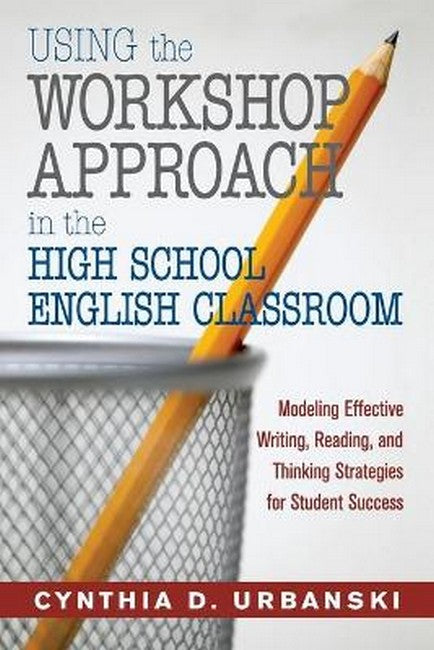Cynthia D. Urbanski is a Co-Leader of the University of North Carolina-Charlotte Writing Project, where her focus is teacher research, summer institutes, and structuring professional development for surrounding areas. Since graduating from the North Carolina Teaching Fellows Program at UNC-Chapel Hill in 1995 and while completing a master's of English education at UNC-Charlotte in 2000, she has worked with writers from middle grades through the undergraduate level. As an instructor at North Mecklenburg High School since 2000, she has worked with student writers in the International Baccalaureate Program as well as standard-level English courses. Her mission has been to help all students improve their literacy skills by making their writing, reading, and thinking meaningful to them. She continues to run regularly and considers it an integral part of her writing process and her life. Currently she is working to develop the concept of her second book project and spending time with her family in Charlotte, North Carolina.
Request Academic Copy
Please copy the ISBN for submitting review copy form
Description
Foreword by Lillian Brannon Acknowledgments About the Author 1. Running and Writing The Workshop Culture - A Study of Coaching Conclusions and The Mission 2. Who Writes the Rule Book Anyway? Accountability, Tests, and the History of Rhetoric A Bit of History And What About the Other Parts of My Curriculum? Testing and Accountability Conclusions Suggested Reading 3. Coaching and Teaching By Doing; Modeling Thinking, Writing, and Reading A Horror Story in Two Scenes Scene I: Sunday Night Back in the Dark Ages Scene II: Sunday Night One Week Later Modeling; A Simple Concept With Huge Benefits Modeling Gives Us Fresh Experiences to Draw From Modeling Can Transform Our Classrooms Modeling Fosters Authentic Learning Modeling Will Supercharge Our Planning Time Modeling In Our Classrooms: What Do We Do? Modeling Concepts for Writing A Lesson in Modeling Writing Modeling Concepts for Reading A Lesson in Modeling Close Reading and Analysis Conclusions: Pulling It All Together and Coming Full Circle 4. Warming Up the Writing Muscles; Two Tools for Invention Free Writing What Is Free Writing . . . Really? Why Does Free Writing Work? Application: Helping Our Students Discover the Magic A Lesson in Free Writing The Last Word on Free Writing Daybooks. A Place to Store Free Writing and Thinking Conclusions 5. The Practice Field; Building Strength and Confidence in Writing and Literary Analysis Types of Practice Reader Response and Invention In-Class Revision and Drafting Types and Progression of Assignments as Practice Conclusions 6. Race Day: Evaluation and the Idea of Grammar Grammar in Context The Bottom Line On Grammar A Grammar Lesson A Word of Caution For Further Ideas A Word About Standards Watching the Race: Evaluating Student Writing Grading Practice Writing Without Eradicating Its Purpose Grading Response Journals or Daybooks Grading Published Pieces Portfolios: Looking at the Whole Season and Student Growth Over Time Conclusions Suggested Reading 7. Responding as a Spectator: The Writing Conference Why Conference Anyway? A Trek Through a Conference Log Writing Conventions/Skills in Context A Fifty-Minute Tutoring Session Translated Into a Ninety-Minute Class Basic Behavior in a Writing Conference A Close-up Look at a Conference Conclusions 8. Becoming Independent; Writing and Literature Groups A Scenario: Student Writing as Class Literature Student Response to Groups How to Make Groups Work Model Functional Groups Provide Structure and Incentive Help Students Find Their Own Structure What About the Kid Who Doesn't Buy Into Group Work? Timing Writing Groups Literature Groups Conclusions Suggested Reading Epilogue - Why Teachers Coach References Index
"Both new and veteran English teachers will learn new strategies that will enrich their students' lives while greatly improving their writing clarity, voice and precision." -- Charles M. Longbottom, International Baccalaureate Program Coordinator "This book offers motivation and inspiration for preservice and novice English teachers and provides reassurance and encouragement for the veteran teachers who feel burdened by the standardization of education. It takes into account the high-stakes accountability of our current environment and documents results from research based practices. The examples and lessons reassure us that effective teaching does not have to give way to 'teaching to the test'." -- Nelda R. Cockman, Clinical Assistant Professor "Drawing from her experience as a coach, the author demonstrates the importance of modeling in the classroom by reading and writing alongside her students, taking risks, and building a strong community of learners in the process. This book will inspire good English teachers to become great literacy coaches." -- Robin Boswell, Middle School Language Arts Instructor "It is possible to balance test preparation with advanced thinking, reading, and writing skills. This book shows you how." -- Journal of Adolescent & Adult Literacy, May 2006

